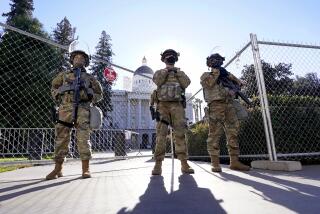Diversity Opened Doors for U.S. General
- Share via
WASHINGTON — Army Maj. Gen. Antonio M. Taguba, author of the searing report on U.S. mistreatment of Iraqi prisoners near Baghdad, grew up in racially diverse Hawaii, where he learned early in life that ethnicity need not be a barrier to success.
“Hawaii opened my mind to the capabilities and opportunity in America,” Taguba told the publication AsianWeek in 1997, when he became the second Filipino American to attain the rank of brigadier general.
Now one of the Army’s top Asian Americans, the 53-year-old Taguba was serving in the low-profile post of deputy commanding general of the 3rd Army when allegations of prisoner abuse at Abu Ghraib prison began working their way up the military chain of command. The 3rd Army’s area of responsibility extends from East Africa through the Middle East and into south-central Asia and includes Iraq and Afghanistan, countries in which prisoner abuse is being investigated.
Within about 10 days, Taguba found himself directing an administrative review that eventually set off a political firestorm in Washington -- and condemnation of the U.S. in much of the Islamic world.
Taguba’s classified report, leaked to the media, documented widespread “systemic and illegal” abuse of prisoners, such as forcing them to assume degrading positions, photographing them in the nude and subjecting them to illegal interrogation methods. Congress is also investigating.
Taguba’s career in the Army spans more than three decades. A native of the Philippines, he is the son of a U.S. Army sergeant, a recipient of the Bronze Star for bravery who was captured by the Japanese in 1942 and escaped from the notorious Bataan Death March.
Taguba and his siblings -- two brothers and five sisters -- were raised mostly by their mother and grandmother while their father was serving in Germany, Okinawa and South Korea.
“I had an absentee father who was in the Army. But I had an enjoyable childhood,” Taguba told AsianWeek, recalling an upbringing that emphasized regard for others.
“It’s part of our culture to respect elders, give thanks to the Lord, to be forgiving, and be supportive of your family,” he said in that interview.
At age 11, Taguba moved to Hawaii with his family. “Hawaii opened my mind to the capabilities and opportunities in America,” he recalled. “The diversity gave me a wide range to seek opportunities and to relate to other people.”
Taguba, who was in Kuwait and could not be reached Tuesday, is an ROTC graduate of Idaho State University and received a history degree in 1972. He holds graduate degrees in public administration, international relations, and national security and strategic studies.
His postings have included Germany, where he commanded a tank company of a mechanized infantry division, and South Korea, where he served as executive officer of joint South Korean and U.S. forces.
Before his current assignment, Taguba was acting director of Army staff at the Pentagon. Before that he ran the Army’s Community and Family Support Center, which provides social services to soldiers and their families around the globe.
More to Read
Sign up for Essential California
The most important California stories and recommendations in your inbox every morning.
You may occasionally receive promotional content from the Los Angeles Times.













